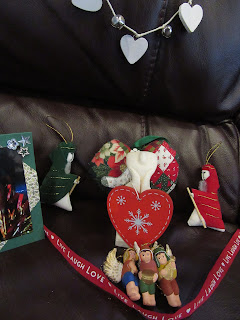Christmas Nagging
I know it’s been
a while since I updated this blog.
Lately, I’ve got a bit blogged down in writing fanfiction inspired by
some of my favourite fantasy novels, or self-publishing an original novel
online, Pilgrims, about
a group of people on a sponsored walk from London to Canterbury. I’ve also been reading other people’s
fanfiction, particularly Mood Music, a Harry Potter fanfic in which Professor Snape and a Muggle shaman escape from the Death Eaters together, written by the excellent Whitehound.
However, I have
been jolted back into blogging by a magazine article about Christmas which made
me shout, ‘They think people need to be told
that?’ It started off, reasonably
enough, by discussing the relative merits of real and artificial Christmas
trees. It concluded that artificial
Christmas trees, considering the amount of energy they cost to make, would have
to be re-used for twenty years to be more eco-friendly than cut trees. After all, real Christmas trees come from
managed plantations and have had a lifetime of absorbing carbon dioxide before
they are felled and replaced with new ones.
It briefly
mentioned that a third option was to keep a live tree in a pot, which is an
idea that I think deserves more celebration.
For the last two Christmases, we have had a young spruce tree (nicknamed
Sprucie Baby) who lived in the garden for 353 days of the year. Spruce was so small that he could only hold a
tiny assortment of ornaments. The only
way to arrange presents under him was to place his pot on something high, like
a table or a piano, and then put the presents under the table or piano.
Unfortunately, I
forgot to water him through the dry spring of 2017. He struggled through somehow, putting out
valiant bursts of fresh green needles at the tips of desiccated branches, and
just about made it into last Christmas.
In January 2018, I moved him into a larger pot, lined with a cocktail of
freshly-collected dung from rabbits, horses, and sheep, to try to give him
something to live for. It was too late,
however, and he died of post-transplant shock soon afterwards. We plan to get a new tree, and hope to be
more successful in keeping this one alive.
The article went
on to warn that tinsel is not recyclable.
Well, obviously it isn’t, in that you can’t put it in a recycling bin,
but, really, who throws out decorations and buys a new set each year? Apart from greenery like holly and ivy (which
is compostable), most of us have collections of decorations built up over
years, or generations. Part of the fun
of decorating is thinking, ‘Oh, I remember making these paper angels as a
child! And this kitsch plastic cherub is
from my mum’s childhood, and these glass icicles used to belong to my partner’s
grandmother.’
In similar vein,
it suggests that instead of buying a garish acrylic Christmas jumper with a
picture of Rudolph the Red-Nosed Reindeer, you could ask a relative to knit you
one from sheep’s wool, so that it’s biodegradable. Or if you’re vegan, it adds as an
afterthought, you could always buy your synthetic jumper second-hand from a
charity shop, and wear it on successive years, instead of throwing it away
after one Christmas.
I don’t have a
special jersey just for Christmas (the nearest I get to seasonal dressing is to
wear my blue and purple T-shirts more often in Advent). But I’d never dream of buying a new
item of clothing and throwing it away after just one wearing. I didn’t even do that with my wedding outfit
(a family hand-me-down – and if it hadn’t fitted, there was a good second-hand
shop nearby).
However smug I
might feel here, I’m probably less likely to follow the magazine’s suggestion
to serve a vegan Christmas dinner, as I don’t think my partner and guests would
appreciate it. If you are habitually
vegetarian or vegan, presumably you cook this way at Christmas, too (and I have
eaten some delicious nut roasts at vegetarian friends’ Christmas parties). But if you’re not, then, as Advent is
traditionally a time of fasting, like Lent, surely it makes more sense to
reduce your carbon footprint by going vegetarian or vegan from now until Christmas?
A variant on
this could be attempting the Live Below the Line challenge, living on £1 worth of food per day for five days. Or, if you don’t like soliciting donations,
you could just try to live on the cheapest food you can afford during Advent,
and donate what you would otherwise have spent on groceries or restaurant meals
to charity. I’m making a start on this,
which in practice means eating less meat and more pea-and-barley stew anyway.
However, if you
are very poor, anorexic, or just tend to neglect yourself, you may already be
eating far too little. If so, I’d rather
you took up the challenge of feeding the hungry, including yourself. Possibly
there’s something else you spend too much on (like cigarettes) which you could
replace with food, but you know your circumstances best.
You may be
planning who to spend Christmas with, or feeling sad because you have no-one to
spend it with. Many people assume that ‘Christmas
is a time for family,’ and that this means the nuclear family, and therefore
that, if you don’t have a partner and children, you are expected to be isolated. But if you are on your own, and
your friends are in a similar situation, why not get together with them? Or why not invite your friend who doesn’t get
on with his family to come and join yours for Christmas?
Now I’d better
go to the food bank and donate those biscuits and hot chocolate I’m trying to
swear off during Advent – quick before I open them!




Comments
Post a Comment